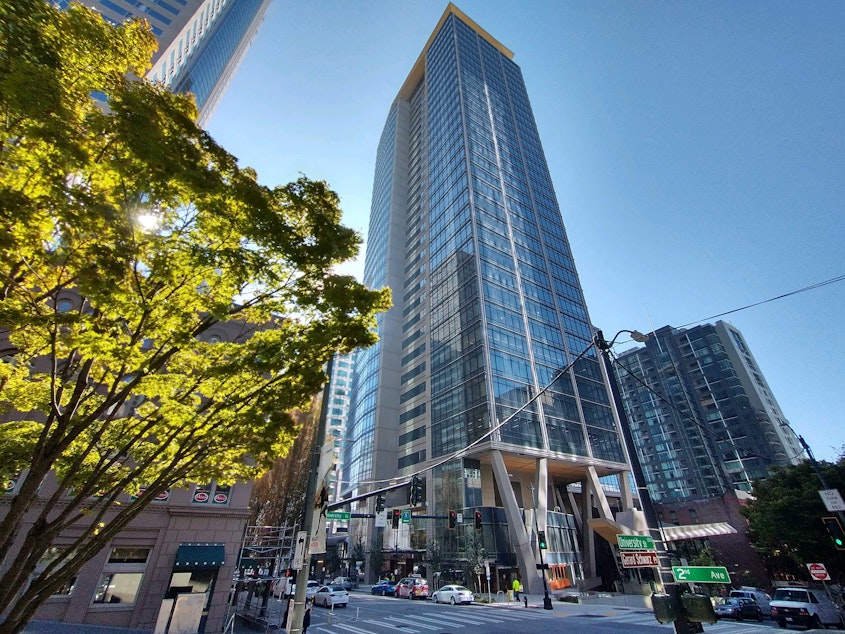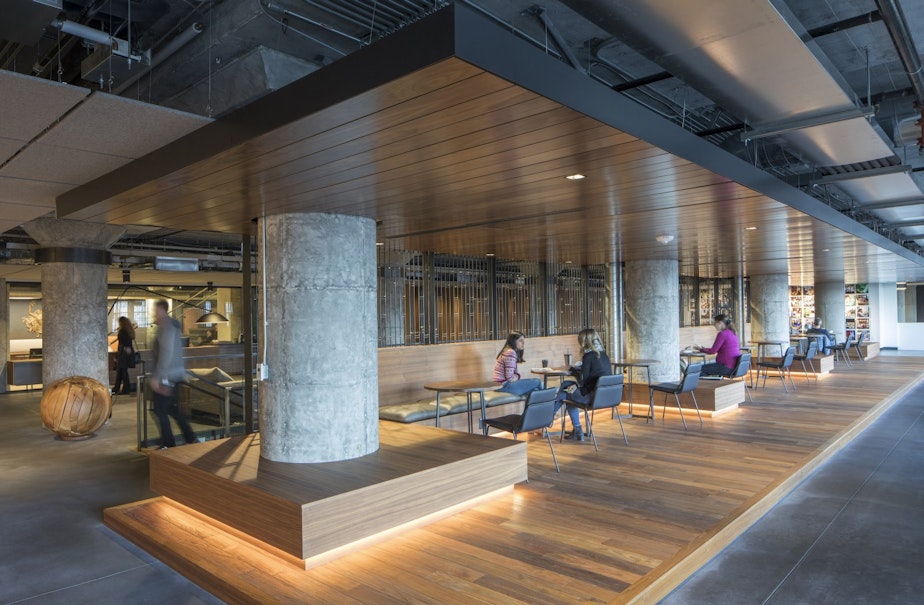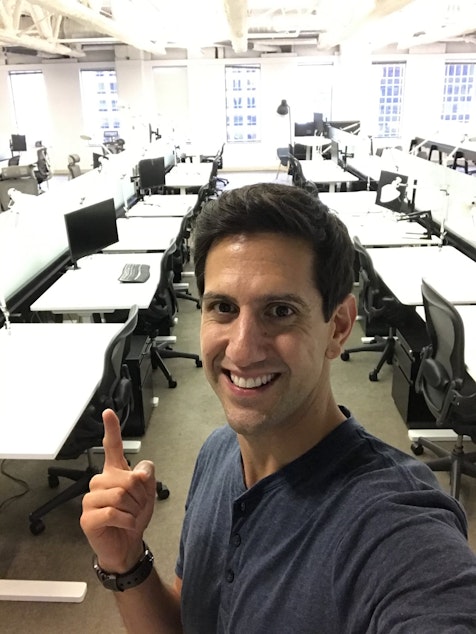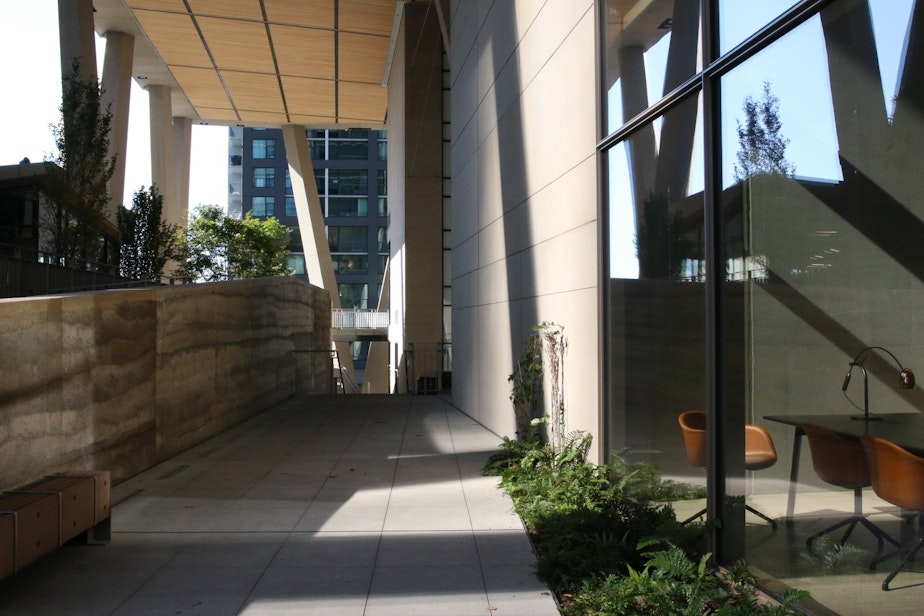Two trends reveal why downtown Seattle will eventually rebound

Seattle is full of empty offices right now. But after the pandemic is over, many companies are saying workers can still work from home.
So, what does that mean for all the office space Seattle built over the last 10 years? Did we build too much of it?
It wasn’t long ago, that you could stand at the Space Needle observation deck and count more construction cranes than just about any other American city.
The office towers they started building before the pandemic are still being finished now. But it’s unclear: Do we even need all that space, now?
Two trends, hoteling and subleasing, may help us answer that question.
Hoteling: when your desk isn't just yours anymore
It turns out, a lot of people like working from home, at least part time.
Sponsored
And that gives the companies where we work an opportunity, according to Michael Schutzler, CEO of the Washington Technology Industry Association. Companies can throw out the idea of giving anyone their own desk.
“Everything’s bookable. You don’t have to come to the office, but when you do come to the office, book a spot.”
This practice of booking desks is called hoteling. It’s not a new idea, but when combined with remote work, its time may have finally come.
Starbucks HQ will take a pandemic gap year to rethink work
Interest in hoteling so called “agile workspace” strategies is up 500% since the beginning of the pandemic, according to Nai Kanell of SpaceIQ, a company whose software helps offices manage desk space.
Sponsored
In the short term, hoteling allows companies to manage worker re-entry into offices in ways that keep them socially distant from each other during a pandemic. Whether workers are alternating their days in the office, or occupying every other desk, hoteling systems allow companies to schedule workers so that they're not too close to one another.
But in the long term, companies are realizing that when workers spend much of their work life at home, then multiple workers can share the same desk at the office and the company does not need quite as much space for desks.

Starbucks is the first major Seattle company to act on this realization. The company recently announced it is embracing what are effectively hoteling techniques at their Seattle headquarters. This will free up space that they can use to create new kinds of meeting spaces (The company is still working out what the precise balance of hoteling and permanent desks will be).
Other companies may look at space savings created by hoteling and realize they can save money on rent. Those savings become clear when you consider a big tech company like F5, says Michael Schutzler, which has a large chunk of the floors in the F5 building. Why, he asks, would the company hold on to all that real estate? “Lease out a third of that and hotel the rest,” Schutzler says.
Sponsored

It’s important not to overstate the amount of space companies could save. But Seattle is a town where a few large companies take up a lot of real estate. Across a large company like Amazon, it’s easy to see how space savings could quickly add up.
Sponsored
The practice of hoteling could indirectly benefit smaller companies, like startups. Big companies that don’t need as much space, maybe because they’re hoteling desks, maybe for other reasons, can sublease it out.
Subleasing: When one company shrinks, another can grow
Greg Inglin is the Executive Vice President with the Colliers International office in Seattle. He says subleases are 32% more common since the beginning of the pandemic.
“What that does is it allows say a younger company or someone that’s looking to grow, to really trade up and end up in better space at a lower rate,” Inglin says.
A shortage of real estate isn’t the only thing keeping startups out of downtown Seattle, Inglin says, but it does play a role in their growth.
Sponsored
Here’s an example of how that helps smaller companies.
There's this fast-growing Seattle startup called ShelfEngine. They use machine learning to help grocery stores manage their shelf space. They had outgrown their space, and it was kind of bland, too, which can hurt a company’s odds of attracting tech workers.
And they didn’t want WeWork space. Like living with roommates, co-working spaces can be good when you’re young, but it wouldn’t necessarily communicate to job candidates that the company was here to stay.
When a company called Digital Kitchens put its extra space on the sublease market, ShelfEngine snapped it up.

“We probably wouldn’t have had such an easy of a time getting such a beautiful office if it were pre-pandemic where the commercial real estate market was even healthier and it was more competitive,” says Salar Salahshoor of ShelfEngine. “Now, there are a lot more options, and so having an exclusive address in downtown Seattle is a little bit easier.”
Sponsored
Salahshoor says his company’s employees are all working remotely now, but they can’t wait until it’s safe to get back to the office. That’s because working together, and socializing together outside of work, are how you build company culture.
“Really connecting together around our values around our mission and building a strong culture is very, very, difficult to do when you’re not interacting in person,” Salahshoor says.
He also says he can’t imagine his company growing anywhere but in downtown Seattle. Being in downtown Seattle helps the company attract workers who feel energized by urban life. That’s a value Salahshoor says informs their work.
“It’s in our DNA,” he says.
Listen: How coronavirus is shaping the future of work, on Seattle Now.
The enthusiasm that Salahshoor and other entrepreneurs show for keeping offices downtown after the pandemic is one reason experts say downtown Seattle is likely to bounce back, after a turbulent and difficult year ahead.

Greg Inglin says it’s too early to know how far companies will go with embracing the two trends of hoteling and subleasing. But if companies do end up reducing their footprints, it could have a silver lining: more room for organizations that otherwise could never have afforded to be in downtown Seattle.

